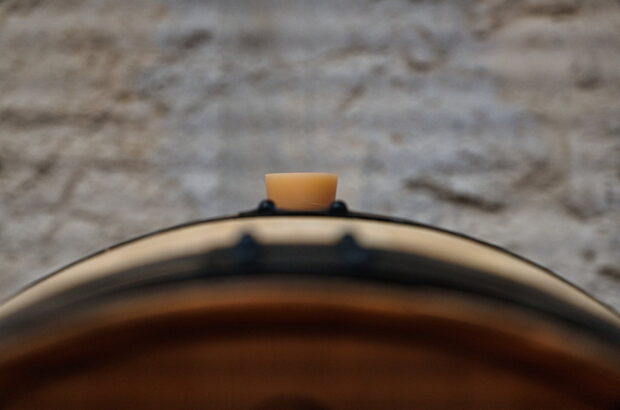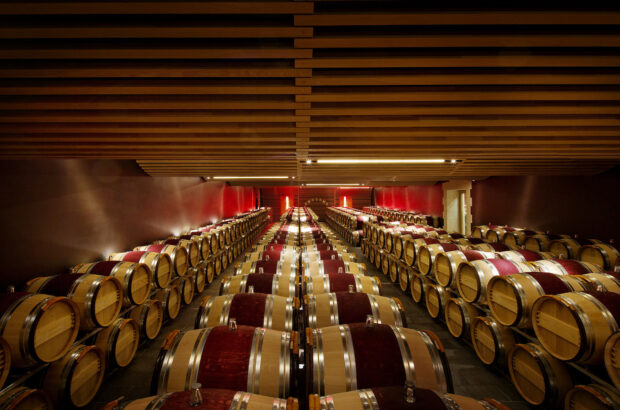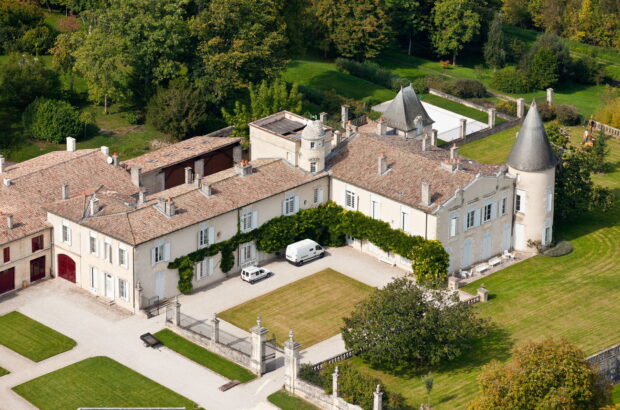Simon Woolf investigates reports of a counter-revolution in Italian wine cellars...
There’s a brief but dramatic moment in Paolo Casalis’ 2014 film Barolo Boys: The Story of a Revolution when winemaker Elio Altare takes a chainsaw to an imposing line of botti (traditional large oak casks) standing in his family’s cellar.
His ritual destruction of these venerable vessels, enacted in 1983, had a practical purpose – to make space for newly purchased, smaller French oak barriques. But the potent symbolism was clear – the supposedly fetid, decaying botti represented the old order. Lines of perfect, newly coopered barriques sent out a clear message of modernity and style.
Scroll down to see Woolf’s selection of Italian wines made without oak
What seemed cutting-edge in 1983 had become de rigueur for prestigious Italian wineries by the late 1990s. But more recently, the barrique’s decisive oaken caress has fallen out of favour, from Friuli in the northeast to Sicily in the south and all points between.
Italy’s winemakers are increasingly switching to alternative materials and vessels for fermentation and ageing, ranging from the arcane to outright outré.
Where barriques once stood, now might be amphorae, Georgian qvevris, concrete eggs or large acacia barrels. Is this merely the cyclical grind of fashion’s treadmill, or part of a more decisive movement towards greater authenticity and expression?
{"content":"PC9wPgo8aDI+QWZ0ZXIgYSBmYXNoaW9uPC9oMj4KPHA+SXTigJlzIHdvcnRoIHRha2luZyBhIGxvb2sgYXQgd2h5IGFuZCBob3cgYmFycmlxdWVzIGJlY2FtZSBzbyBwb3B1bGFyLiBVbnF1ZXN0aW9uYWJseSBhIEZyZW5jaCBwaGVub21lbm9uLCB0aGUgMjI1LWxpdHJlIGJhcnJpcXVlIOKAmEJvcmRlbGFpc+KAmSwgYW5kIGl0cyBjbG9zZSBjb3VzaW4gdGhlIDIyOC1saXRyZSBCdXJndW5keSDigJhwacOoY2XigJkgaGF2ZSBiZWVuIHdlbGwtZXN0YWJsaXNoZWQgaW4gdGhlaXIgcmVnaW9ucyBvZiBvcmlnaW4gZm9yIGNlbnR1cmllcyDigJMgYW5kIHRoZWlyIGluZmx1ZW5jZSBvbiB0aGUgbG9jYWwgd2luZXMgaGFzIGFsbW9zdCBiZWNvbWUgcGFydCBvZiB0aGUgdGVycm9pciBpdHNlbGYuIEl0YWx5IGluIGNvbnRyYXN0IGhhcyBubyBzdWNoIGhpc3Rvcnkgb2YgYWdlaW5nIG9yIHN0b3Jpbmcgd2luZSBpbiBzbWFsbCBvYWsgYmFycmVscy48L3A+CjxwPlRoZSBJdGFsaWFuIHRyYWRpdGlvbiwgZGF0aW5nIGJhY2sgdG8gdGhlIFJvbWFuIGVyYSwgaXMgZm9yIGJvdHRpOiBsYXJnZSBvYWsgdmF0cyBvZiAxLDAwMCBsaXRyZXMgb3IgbW9yZSwgbWFkZSBtb3N0IGNvbW1vbmx5IG9mIFNsYXZvbmlhbiBvYWsuIFNsYXZvbmlhLCBub3QgdG8gYmUgY29uZnVzZWQgd2l0aCBTbG92ZW5pYSwgZm9ybXMgdGhlIGlubGFuZCBlYXN0ZXJseSBwYXJ0IG9mIHdoYXQgaXMgbm93IENyb2F0aWEuPC9wPgo8ZGl2IGNsYXNzPSJhZC1jb250YWluZXIgYWQtY29udGFpbmVyLS1tb2JpbGUiPjxkaXYgaWQ9InBvc3QtaW5saW5lLTMiIGNsYXNzPSJpcGMtYWR2ZXJ0Ij48L2Rpdj48L2Rpdj4KPHA+VGhlIGRpZmZlcmVuY2VzIGJldHdlZW4gYmFycmlxdWVzIGFuZCBib3R0aSBhcmUgY2VydGFpbmx5IG5vdCBqdXN0IGFlc3RoZXRpYy4gU2xhdm9uaWFuIG9hayBpcyBkZW5zZS1ncmFpbmVkLCBsb3cgaW4gdGFubmlucyBhbmQgYXJvbWFzIHdoZW4gY29tcGFyZWQgdG8gaXRzIEZyZW5jaCBjb3VzaW5zLiBUaGUgc21hbGxlciBzdXJmYWNlIGFyZWEgdG8gdm9sdW1lIHJhdGlvIG9mIGEgbGFyZ2UgYmFycmVsLCBpbiBjb21iaW5hdGlvbiB3aXRoIHRoZSB0eXBlIG9mIG9haywgYWRkcyB1cCB0byBhIHZlcnkgbmV1dHJhbCB2ZXNzZWwuIEFsbW9zdCBubyBmbGF2b3VyIGlzIGltcGFydGVkIHRvIHRoZSB3aW5lLCB3aGljaCBhZ2VzIGdyYWNlZnVsbHkgd2l0aCBhIG1pbnV0ZSBpbmdyZXNzIG9mIG94eWdlbi48L3A+CjxwPlRoaXMgc2xvdywgcGF0aWVuY2UtcmVxdWlyaW5nIHByb2Nlc3Mgd2FzIGp1c3Qgb25lIGRpc2FkdmFudGFnZSBpbiB0aGUgZXllcyBvZiBtb2Rlcm5pc3QgcHJvZHVjZXJzLCB3aG8gd2FudGVkIHRoZWlyIEJhcm9sb3Mgb3IgU3VwZXJUdXNjYW4gQ2FiZXJuZXRzIHRvIGJlIGJyb2FjaGFibGUgbXVjaCBlYXJsaWVyLiBCYXJyaXF1ZXMgbm90IG9ubHkgc3BlZWQgdXAgdGhlIHByb2Nlc3Mgb2YgbWljcm8tb3h5Z2VuYXRpb24sIHRoZXkgYWxzbyBhbGxvdyBmYXIgbW9yZSBmbGV4aWJpbGl0eSB3aGVuIGl0IGNvbWVzIHRvIGxvZ2lzdGljczogc2luZ2xlIHZpbmV5YXJkIG1pY3JvLWN1dsOpZXMgYXJlIGhhcmRseSBwb3NzaWJsZSBpZiBhIDIsMDAwLSBvciA1LDAwMC1saXRyZSBib3R0aSBoYXMgdG8gYmUgZmlsbGVkIHRvIHRoZSB0b3Ag4oCTIGFzIGl0IG11c3QsIHRvIHByZXZlbnQgb3hpZGF0aW9uLjwvcD4KPGRpdiBjbGFzcz0iYWQtY29udGFpbmVyIGFkLWNvbnRhaW5lci0tbW9iaWxlIj48ZGl2IGlkPSJwb3N0LWlubGluZS00IiBjbGFzcz0iaXBjLWFkdmVydCI+PC9kaXY+PC9kaXY+CjxwPlRoZSBmYXNoaW9uIGZvciBiYXJyaXF1ZXMgY29pbmNpZGVkIHdpdGggdGhlIHJpc2UgaW4gdGhlIDE5ODBzIG9mIFVTIHdpbmUgY3JpdGljcyBzdWNoIGFzIFJvYmVydCBQYXJrZXIgSnIgYW5kIEphbWVzIFN1Y2tsaW5nLCB3aG8gYXBwZWFyZWQgdG8gZmF2b3VyIHN1cGVyLWNvbmNlbnRyYXRlZCB3aW5lcyBtYWRlIHdpdGggbG90cyBvZiBuZXcgb2FrLiBUaGUgbW92ZW1lbnQgd2FzIHVuZG91YnRlZGx5IGFjY2VsZXJhdGVkIGJ5IGEgZ3JvdXAgb2YgeW91bmdlciBwcm9kdWNlcnMgaW4gUGllZG1vbnQgbmlja25hbWVkIHRoZSBCYXJvbG8gQm95cyAodGhlIGNoYWluc2F3LXdpZWxkaW5nIEFsdGFyZSwgQ2hpYXJhIEJvc2NoaXMsIEdpb3JnaW8gUml2ZXR0aSBhbmQgUm9iZXJ0byBWb2VyemlvKSwgYW5kIHNwZWNpZmljYWxseSBieSB0aGVpciBwcm9tb3Rlci1pbi1jaGllZiBNYXJjbyBkZSBHcmF6aWEuPC9wPgo8aDI+VG9uZSBpdCBkb3duPC9oMj4KPHA+Tm90IGV2ZXJ5b25lIHNhdyBleWUtdG8tZXllIHdpdGggdGhlIG5ldyB0cmVuZCBmb3IgZWFybGllci1kcmlua2luZywgbW9yZSBoZWRvbmlzdGljIHdpbmVzOiB0aGUgbGF0ZSBhbmQgaWNvbmljIEJhcm9sbyBwcm9kdWNlciBCYXJ0b2xvIE1hc2NhcmVsbG8gZmFtb3VzbHkgcmVsZWFzZWQgYSBoYW5kcGFpbnRlZCDigJhObyBCYXJyaXF1ZSwgTm8gQmVybHVzY29uaeKAmSBsYWJlbCBmb3IgaGlzIHdpbmVzIGluIDE5OTkuIFJvYmVydG8gQ29udGVybm8gKGN1cnJlbnQgcHJvcHJpZXRvciBhdCBHaWFjb21vIENvbnRlcm5vKSBpcyBhbm90aGVyIG9mIHRoZSByZWdpb27igJlzIHRyYWRpdGlvbmFsaXN0cyB3aG8gd2FzIG5ldmVyIHRlbXB0ZWQgdG8gc3dpdGNoOiDigJhXZSBkb27igJl0IHdhbnQgdG8gYWRkIHdvb2QgdGFubmlucyBvciB3b29kIGFyb21hcyB0byBvdXIgd2luZXMsIGJ1dCBvbmx5IGVsZW1lbnRzIHRoYXQgY29tZSBmcm9tIHRoZSBncmFwZSBhbmQgdGhlIHZpbmV5YXJkLOKAmSBoZSByZW1hcmtzIGVtcGhhdGljYWxseSBhYm91dCBoaXMgY2hvaWNlIHRvIHN0aWNrIHdpdGggYm90dGkuPC9wPgo8ZGl2IGNsYXNzPSJhZC1jb250YWluZXIgYWQtY29udGFpbmVyLS1tb2JpbGUiPjxkaXYgaWQ9InBvc3QtaW5saW5lLTUiIGNsYXNzPSJpcGMtYWR2ZXJ0Ij48L2Rpdj48L2Rpdj4KPHA+RGUgR3JhemlhIGNhdXRpb25zIHRoYXQgbWF5YmUgdGhlIGJhcnJpcXVlIHdhcyB1bmZhaXJseSBzaW5nbGVkIG91dCBmcm9tIG90aGVyIHZpbmV5YXJkIGFuZCB3aW5lcnkgaW5ub3ZhdGlvbnMgKGdyZWVuIGhhcnZlc3RpbmcsIGh5Z2llbmUpIG1hZGUgYnkgdGhlIEJhcm9sbyBCb3lzOiDigJhQZW9wbGUgbmVlZCBhbiBlYXN5IHNjYXBlZ29hdCwgc29tZXRoaW5nIGZvcmVpZ24gdGhhdCB0aGV5IGNhbiBwb2ludCB0aGVpciBmaW5nZXIgYXQs4oCZIGhlIGV4cGxhaW5zLiDigJhUaGUgYmFycmlxdWUgYmVjYW1lIGV4YWN0bHkgdGhhdC4gTm9ib2R5IGhhZCBldmVyIHNlZW4gaXQgb3IgaGVhcmQgb2YgaXQuIEl0IGJlY2FtZSB0aGUgZGlhYm9saWNhbCBpbnN0cnVtZW50IHBhciBleGNlbGxlbmNlLuKAmTwvcD4KPHA+U3RpbGwsIGJ5IHRoZSBsYXRlIDE5OTBzIGN5bmljYWwgb2JzZXJ2ZXJzIG1pZ2h0IGhhdmUgbm90ZWQgdGhhdCBhbWJpdGlvdXMgSXRhbGlhbiB3aW5lcmllcyBwcmFjdGljYWxseSBoYWQgYSBmb3JtdWxhIGZvciB0aGVpciBwcmVtaXVtIGN1dsOpZXMuIEl0IGluZXZpdGFibHkgaW52b2x2ZWQgYWdlaW5nIGZvciAyNCBtb250aHMgaW4gYXMgbXVjaCBuZXcgRnJlbmNoIG9hayBhcyB0aGUgZXN0YXRlIGNvdWxkIGFmZm9yZCwgbWljcm9zY29waWMgeWllbGRzLCBtaWNyby1veHlnZW5hdGlvbiBhbmQgYSBzdWl0YWJseSBoZWF2eSBib3R0bGUuPC9wPgo8cD5UaGUgZm9jdXMgaW4gdGhlIHBhc3QgZGVjYWRlIGhhcyBpbmNyZWFzaW5nbHkgbW92ZWQgdG93YXJkcyBhdXRoZW50aWNpdHksIGludGVncml0eSBhbmQgc3VzdGFpbmFiaWxpdHkg4oCTIGFsbCBjb25jZXB0cyB0aGF0IHByb3BlbCBwcm9kdWNlcnMgdG93YXJkcyBhZ2Vpbmcgc29sdXRpb25zIHRoYXQgZG9u4oCZdCBsZWF2ZSBzdWNoIGFuIG9idmlvdXMgZm9vdHByaW50IG9uIHRoZWlyIHdpbmVzLCBvciBvbiB0aGUgcGxhbmV0LiBBbHRob3VnaCBzdGFpbmxlc3Mgc3RlZWwgdGFua3MgYXJlIHN0aWxsIHBvcHVsYXIgYXMgYSBwcmFjdGljYWwgYW5kIGh5Z2llbmljIHNvbHV0aW9uLCBtYW55IHByb2R1Y2VycyBiZWxpZXZlIHRoYXQgYWdlaW5nIGluIGEgbW9yZSBwb3JvdXMgb3IgYnJlYXRoYWJsZSBtYXRlcmlhbCBpcyBwcmVmZXJhYmxlLjwvcD4KPHA+VW5saW5lZCBjZW1lbnQgb3IgY29uY3JldGUgaGFzIHNpbWlsYXIgYnJlYXRoYWJpbGl0eSB0byBhbiBvYWsgdmF0LCBidXQgZG9lc27igJl0IGhhcmJvdXIgYmFjdGVyaWEgYXMgZWFzaWx5IGFuZCBpcyBtdWNoIGVhc2llciB0byBtYWludGFpbi4gQ2VtZW50IHRhbmtzIGFyZSB1c3VhbGx5IHRyZWF0ZWQgd2l0aCBhIHRhcnRhcmljIGFjaWQgd2FzaCBmb3IgaHlnaWVuZSBwdXJwb3Nlcy4gRXBveHkgbGluaW5nIGlzIGFub3RoZXIgb3B0aW9uLCBidXQgZm9yc2FrZXMgdGhlIGFlcm9iaWMgYWR2YW50YWdlcyBhbmQgcmVzdWx0cyBpbiBhIHZlc3NlbCB3aXRoIHRoZSBzYW1lIHJlZHVjdGl2ZSBxdWFsaXRpZXMgYXMgc3RhaW5sZXNzIHN0ZWVsLjwvcD4KPHA+V2FsbHMgb2Ygb2Z0ZW4gYnJpZ2h0bHkgcGFpbnRlZCBjZW1lbnQgdmF0cyBhcmUgc3RpbGwgYSBjb21tb24gc2l0ZSBpbiBtYW55IGhpc3RvcmljIGNlbGxhcnMsIGFuZCBlc3BlY2lhbGx5IGluIHRoZSBsYXJnZSBjYW50aW5lIHNvY2lhbGUgKHRoZSBjb29wZXJhdGl2ZXMgd2hpY2ggdXNlZCB0byBkb21pbmF0ZSBwcm9kdWN0aW9uIGluIG1hbnkgSXRhbGlhbiByZWdpb25zKS4gVGhvc2UgcHJvZHVjZXJzIHdobyByZXN0cmFpbmVkIHRoZW1zZWx2ZXMgZnJvbSBpbXBhdGllbnRseSByaXBwaW5nIHRoZWlyIHRhbmtzIG91dCBoYXZlIG9mdGVuIGJlbmVmaXRlZC4gQXMgdGhlIHRpZGUgb2YgZmFzaGlvbiB0dXJucyBmcm9tIG92ZXJ0IHVzZSBvZiBuZXcgb2FrIHRvIG1vcmUgc3VidGxlIGFnZWluZyBtZXRob2RzLCBtYW55IGhhdmUgcmVhbGlzZWQgdGhleSBhcmUgc2l0dGluZyBvbiBhIHJlYWwgYXNzZXQuIFJpY2NhcmRvIEJhbGRpLCB0aGUgeW91bmcgd2luZW1ha2VyIGF0IExhIFN0YWZmYSBpbiBNYXJjaGUsIHVzZXMgY2VtZW50IGV4Y2x1c2l2ZWx5IHRvIGFnZSBoaXMgd2luZXMsIGZpbmRpbmcgdGhhdCB0aGUgYWdlaW5nIHByb2Nlc3MgaXMgbXVjaCBnZW50bGVyIHRoYW4gdGhhdCBvZiBvdmVybHkgcmVkdWN0aXZlIHN0YWlubGVzcyBzdGVlbCB0YW5rcy48L3A+CjxwPkluIHRoZSBzb3V0aCwgUHVnbGlh4oCZcyBDdXBlcnRpbnVtICh0aGUgY2FudGluZSBzb2NpYWxlIG9mIENvcGVydGlubykgcHJvZHVjZXMgb25lIG9mIHRoZSByZWdpb27igJlzIG1vc3QgYXR0cmFjdGl2ZSBleHByZXNzaW9ucyBvZiBOZWdyb2FtYXJvLCBhZ2VpbmcgaXQgb25seSBpbiB2YXN0IGFuZCBoaXN0b3JpYyBjZW1lbnQgdmF0cywgdGhlIGxhcmdlc3Qgb2Ygd2hpY2ggYXJlIDkwMGhsIGluIHNpemUuIFRoZSByZXN1bHRzIHNob3cgZmFyIGdyZWF0ZXIgdmFyaWV0YWwgZXhwcmVzc2lvbiBhbmQgZWxlZ2FuY2UgdGhhbiBtYW55IG9mIHRoZSByZWdpb27igJlzIGNsdW1zeSwgb3Zlci1vYWtlZCBlZmZvcnRzLjwvcD4KPGgyPlJldmlzaXRpbmcgdHJhZGl0aW9uPC9oMj4KPHA+QSA5MDBobCB0YW5rIGlzIGhhcmRseSBwcmFjdGljYWwgZm9yIG1vc3QgcHJvZHVjZXJzLCBhbmQgbWFueSBuZXdlciB3aW5lcmllcyBoYXZlIG5vIHN1Y2ggYW50aXF1ZSB0cmVhc3VyZXMgYXQgdGhlaXIgZGlzcG9zYWwuIENvbmNyZXRlIGVnZ3MsIHdoaWNoIGNhbiBiZSBzZWVuIGhhdGNoaW5nIG91dCBpbiBJdGFsaWFuIHdpbmVyaWVzIGF0IGFzdG9uaXNoaW5nIHNwZWVkLCBhcmUgcHJvdmluZyB0byBiZSBhIHBvcHVsYXIgYWx0ZXJuYXRpdmUuIE9yaWdpbmFsbHkgZGVzaWduZWQgYnkgRnJlbmNoIG1hbnVmYWN0dXJlciBNYXJjIE5vbWJsb3QgaW4gY29sbGFib3JhdGlvbiB3aXRoIE1pY2hlbCBDaGFwb3V0aWVyLCB0aGUgZnV0dXJpc3RpYy1sb29raW5nIG9iamVjdHMgYXJlIGRlc2lnbmVkIHRvIG1heGltaXNlIGNvbnRhY3Qgd2l0aCB0aGUgbGVlcy4gVGhlIG92b2lkIHNoYXBlIGFsc28gY3JlYXRlcyBjb252ZWN0aW9uIGN1cnJlbnRzIHRoYXQgZ2VudGx5IGFuZCBjb250aW51YWxseSByZWRpc3RyaWJ1dGUgdGhlIGNvbnRlbnRzLCByZWR1Y2luZyB0aGUgbmVlZCBmb3IgYmF0b25uYWdlIG9yIHJhY2tpbmcuPC9wPgo8cD5UaGUgY29uY3JldGUgZWdnIGNsZWFybHkgZGVyaXZlZCBkZXNpZ24gaW5zcGlyYXRpb24gZnJvbSB0aGUgc2hhcGUgb2YgUm9tYW4tZXJhIGFtcGhvcmFlLCBhbmQgaWYgdGhlcmXigJlzIG9uZSBjb250YWluZXIgdGhhdCBoYXMgYmVjb21lIG5lYXItaWNvbmljIGZvciBwcm9ncmVzc2l2ZSAyMXN0IGNlbnR1cnkgd2luZW1ha2VycywgaXQgaXMgdGhpcyBzYWNyZWQgdmVzc2VsLiDCoEFtcGhvcmFlIGhhdmUgYSB2ZXJ5IGxvbmcgaGlzdG9yeSBpbiBJdGFseSwgYW5kIG5vdCBvbmx5IGZvciB3aW5lOiBpbiBSb21hbiB0aW1lcyB0aGV5IHdlcmUgcG9wdWxhciBmb3IgdGhlIHN0b3JhZ2Ugb2Ygb2xpdmUgb2lsLCB0b28uPC9wPgo8cD5JbiBQdWdsaWEsIHNtYWxsIGdsYXplZCBhbXBob3JhZSBoYXZlIGJlZW4gdXNlZCB0byBhZ2Ugd2luZSBmb3IgY2VudHVyaWVzLiBWaW5pY29sYSBTYXZlc2UsIGluIE1hbmR1cmlhLCBzdGlsbCB1c2VzIDIyMC1saXRyZSBjYXBhc29uaSB0byBwcm9kdWNlIHNvbWUgb2YgaXRzIHRvcCBQcmltaXRpdm8sIHdoaWNoIGRpc3BsYXlzIGFuIGluY3JlZGlibGUgbGlnaHRuZXNzIG9mIHRvdWNoIGNvbXBhcmVkIHRvIG1vc3Qgb2FrZWQgdmVyc2lvbnMuIFdpbmVtYWtlciBNYXNzaW1pbGlhbm8gUGljaGllcnJpIGlzIG5vIGZhbiBvZiBiYXJyaXF1ZXMgb3Igb3ZlcnQgb2FrIGluZmx1ZW5jZSwgcHJlZmVycmluZyBjZW1lbnQgdGFua3MgYW5kIHVzZWQgYmFycmVscyBhcyB3ZWxsIGFzIHRoZSBjYXBhc29uaS48L3A+CjxwPlRhc3Rpbmcgc29tZSBvZiB0aGUgZXN0YXRl4oCZcyBjb21wbGV0ZWx5IHVub2FrZWQgUHJpbWl0aXZvICh0aGUgcmVnaW9u4oCZcyBzaWduYXR1cmUgdmFyaWV0eSksIGl04oCZcyBjbGVhciB0aGF0IHRoZSBncmFwZSB2YXJpZXR5IGNhbiBlYXNpbHkgc3RhbmQgb24gaXRzIG93biB0d28gZmVldCBpbiB0ZXJtcyBvZiBjb25jZW50cmF0aW9uIGFuZCB0ZXh0dXJlIOKAkyBpdCBiZWdzIHRoZSBxdWVzdGlvbiwgd2h5IGRvIGNyYXNzbHkgb2FrZWQgb3IgY2hpcHBlZCB2ZXJzaW9ucyBzdGlsbCBwcm9saWZlcmF0ZSBvbiB0aGUgc2hlbHZlcz88L3A+CjxwPlB1Z2xpYeKAmXMgYW1waG9yYSB0cmFkaXRpb24gaXMgYXV0aGVudGljIHRvIHRoZSByZWdpb24sIGFuZCB0byBJdGFseSDigJMgYnV0IHRoZSBjdXJyZW50IHRyZW5kIGZvciB1c2luZyBhbXBob3JhZSBmb3IgZmVybWVudGF0aW9uIG93ZXMgbW9yZSB0byBHZW9yZ2lhLCBhbmQgdG8gYW4gaW5ub3ZhdG9yIGF0IHRoZSBvcHBvc2l0ZSBlbmQgb2YgSXRhbHkuIEpvxaFrbyBHcmF2bmVyLCB0aGUgaWNvbm9jbGFzdGljIHdpbmVtYWtlciBmcm9tIEZyaXVsaSBDb2xsaW8sIGJlY2FtZSBmYXNjaW5hdGVkIHdpdGggR2VvcmdpYW4gd2luZW1ha2luZyBjdWx0dXJlIGluIHRoZSAxOTkwcy4gT25lIG9mIHRoZSBmaXJzdCBJdGFsaWFucyB0byBlbWJyYWNlIG9hayBiYXJyaXF1ZXMgaW4gdGhlIDE5ODBzLCBHcmF2bmVyIGxhdGVyIHdvZWZ1bGx5IHJlZ3JldHRlZCBnZXR0aW5nIHJpZCBvZiB0aGUgZmFtaWx54oCZcyBib3R0aTog4oCYTXkgZmlyc3QgbWlzdGFrZSB3YXMgbm90IHVuZGVyc3RhbmRpbmcgZW5vdWdoIGFib3V0IG9hayB3aGVuIEkgd2FzIGJ1eWluZyBiYXJyZWxzIOKAkyBzbyBJIGJvdWdodCBiYXJyaXF1ZXMgaW5zdGVhZCBvZiBib3R0aS4gTXkgc2Vjb25kIG1pc3Rha2Ugd2FzIG5vdCBhZG1pdHRpbmcgdGhlIGZpcnN0IG1pc3Rha2Uh4oCZIGhlIGNvbnRlbmRzLjwvcD4KPHA+Rm9yIHJlc29sdXRpb24sIGhlIGxvb2tlZCB0byB0aGUgd29ybGTigJlzIG9sZGVzdCB3aW5lIGN1bHR1cmUsIGFuZCB0aGUgcXZldnJpIChhIGxhcmdlIEdlb3JnaWFuIHRlcnJhY290dGEgdmVzc2VsIHdoaWNoIGlzIGJ1cmllZCBpbiB0aGUgZ3JvdW5kIHVwIHRvIGl0cyBuZWNrKSwgb3JkZXJpbmcgYSBiYXRjaCBvZiAxMiBpbW1lZGlhdGVseSBhZnRlciBoaXMgZmlyc3QgdmlzaXQgdG8gdGhlIGNvdW50cnkgaW4gMjAwMC4gSGUgbm93IGV4Y2x1c2l2ZWx5IHVzZXMgcXZldnJpcyBmb3IgZmVybWVudGF0aW9uIGFuZCBpbml0aWFsIGFnZWluZywgYW5kIGhhcyBhIHRvdGFsIG9mIDQ2IGJ1cmllZCBpbiBoaXMgY2VsbGFyLjwvcD4KPHA+R3Jhdm5lcuKAmXMgcGlvbmVlcmluZyB3b3JrIGhhcyBiZWVuIGh1Z2VseSBpbmZsdWVudGlhbCwgaW5zcGlyaW5nIGV4cG9uZW50aWFsbHkgaW5jcmVhc2luZyBudW1iZXJzIG9mIHdpbmVtYWtlcnMgdG8gZXhwZXJpbWVudCB3aXRoIGFtcGhvcmFlIHRoZW1zZWx2ZXMuPC9wPgo8aDI+TG9jYWwgc291cmNlPC9oMj4KPHA+QmVsZ2lhbiBGcmFuayBDb3JuZWxpc3Nlbiwgd29ya2luZyBpbiBTaWNpbHnigJlzIEV0bmEgcmVnaW9uLCBpbml0aWFsbHkgYnVpbHQgaGlzIGNlbGxhciBhcm91bmQgYSBjbHVzdGVyIG9mIFNwYW5pc2ggdGluYWphcyAoc21hbGwgNDAwLSBhbmQgNjAwLWxpdHJlIGFtcGhvcmFlKSBpbiAyMDAwLiBNb3JlIHJlY2VudGx5LCB0aGV5IGhhdmUgYmVlbiBhYmFuZG9uZWQgaW4gZmF2b3VyIG9mIGZpYnJlZ2xhc3MgdmF0cywgd2hpY2ggYXJlIGVhc2llciB0byBtYWludGFpbiB0byBoaXMgZXhjZXB0aW9uYWwgaHlnaWVuZSBzdGFuZGFyZHMuIEhlIGhhcyBqb2tlZDog4oCYSeKAmWQgdXNlIHRpdGFuaXVtIGlmIGl0IHdhcyBhZmZvcmRhYmxlLuKAmSBJbiBuZWFyYnkgVml0dG9yaWEsIEdpYW1iYXR0aXN0YSDigJhUaXR0YeKAmSBDaWxpYSwgR2l1c3RvIE9jY2hpcGludGkgYW5kIENpcmlubyBTdHJhbm8gdG9vayBhIHNpbWlsYXIgcm91dGUgYXQgdGhlaXIgbm93IGZhbW91cyBDT1MgZXN0YXRlLCByZXBsYWNpbmcgb2FrIGJhcnJpcXVlcyB3aXRoIDQ0MC1saXRyZSB0aW5hamFzLjwvcD4KPHA+QmFjayBpbiB0aGUgbm9ydGhlYXN0LCBoaWdoIHVwIGluIFRyZW50aW5vLCBFbGlzYWJldHRhIEZvcmFkb3JpIGZvbGxvd2VkIHN1aXQgaW4gMjAwOCBhZnRlciBPY2NoaXBpbnRpIGludHJvZHVjZWQgaGVyIHRvIGhpcyB0aW5hamEtbWFrZXIsIHdoaWxlIGluIEZyaXVsaS1WZW5lemlhIEdpdWxpYSwgQ2Fyc28gd2luZW1ha2VyIFBhb2xvIFZvZG9waXZlYyBhbHNvIGV4cGVyaW1lbnRlZCB3aXRoIFNwYW5pc2ggYW1waG9yYWUgaW4gMjAwMCwgYnV0IGFzIGhlIGV4cGxhaW5zOiDigJhJIHdhc27igJl0IGhhcHB5IHdpdGggdGhlIHJlc3VsdHMsIHNvIEkgdGhyZXcgYXdheSBib3RoIHRoZSB3aW5lIGFuZCB0aGUgYW1waG9yYSHigJk8L3A+CjxwPkZvbGxvd2luZyBhIHRyaXAgdG8gR2VvcmdpYSBpbiAyMDA0LCBWb2RvcGl2ZWMgcHVyY2hhc2VkIEdlb3JnaWFuIHF2ZXZyaS4gSGlzIGltcHJlc3NpdmUgY2VsbGFyIHByb3ZpZGVzIHNwYWNlIGZvciAyNCBxdmV2cmlzIGFuZCB0d28gc2VtaS1jaXJjdWxhciByYW5rcyBvZiAzLDAwMC1saXRyZSBib3R0aS4gVGhlIHdpbmVzIGNvYXhlZCBmcm9tIHRoZXNlIHdvbWItbGlrZSBzdXJyb3VuZGluZ3MgYXJlIGV4dHJhb3JkaW5hcnkgbm90IG9ubHkgZm9yIHRoZWlyIGVsZWdhbmNlLCBidXQgYWxzbyBmb3IgdGhlIGxhY2sgb2YgYW55IHBlcmNlcHRpYmxlIGluZmx1ZW5jZSBmcm9tIHdvb2Qgb3IgY2xheS48L3A+CjxwPkluIGEgY2xlYXIgc2lnbiB0aGF0IHRoZSBhbXBob3Jh4oCZcyB0aW1lIGhhcyBjb21lLCBhIHNsZXcgb2YgZnJlc2hseSBpbmNvcnBvcmF0ZWQgYnVzaW5lc3NlcyBoYXZlIHNwcnVuZyB1cCBvZmZlcmluZyBtb2Rlcm4gYW1waG9yYS1saWtlIHZhcmlhbnRzLCBvZnRlbiBhZG9ybmVkIHdpdGggdGhlIG1ldGFsIHRyYXBzIGFuZCB0YXBzIG1vcmUgbm9ybWFsbHkgc2VlbiBvbiBoaWdoLXRlY2ggc3RhaW5sZXNzIHN0ZWVsIHRhbmtzLiBTb21lLCBzdWNoIGFzIFNpcmlvIEFuZm9yZSAoYmFzZWQgaW4gUGVydWdpYSksIHN0aWNrIHdpdGggdGhlIHRyYWRpdGlvbmFsIHRlcnJhY290dGEsIHdoaWxlIG90aGVycyBzdWNoIGFzIERydW5rIFR1cnRsZSAoaW4gVHVzY2FueSkgaGF2ZSBhZG9wdGVkIHRoZSBhbXBob3JhIGZvcm0gYnV0IHVzZSBhbHRlcm5hdGl2ZSBtYXRlcmlhbHMuPC9wPgo8cD5EcnVuayBUdXJ0bGXigJlzIGNob2ljZSBvZiBjb2NjaW9wZXN0byAoYSB0cmFkaXRpb25hbCBSb21hbiBtaXggb2YgZmluZWx5IGNydXNoZWQgYnJpY2ssIHNhbmQsIGNlbWVudCBiaW5kZXIgYW5kIHdhdGVyKSByZXF1aXJlcyBubyBmaXJpbmcsIGJ1dCBpcyBpbnN0ZWFkIGRyaWVkIGFuZCBoYXJkZW5lZCBzbG93bHkgaW4gdGhlIHN1bi4gQXMgY2hpZWYgZW5naW5lZXIgTmljb2xhIFNicmFuYSBleHBsYWluczog4oCYVGhpcyBhbGxvd3MgdXMgdG8gaGF2ZSBhIG11Y2ggdGhpY2tlciB3YWxsIG9mIDEwY20gW3ZlcnN1cyBhYm91dCAyY20gaW4gdHJhZGl0aW9uYWwgYW1waG9yYWVdLCB3aGljaCBtYWtlcyBpdCBlYXNpZXIgdG8gbWFudWZhY3R1cmUgbGFyZ2VyIHNpemVzLuKAmSBDdXJyZW50bHkgRHJ1bmsgVHVydGxl4oCZcyBsYXJnZXN0IG9mZmVyaW5nIGlzIGFuIGFtcGhvcmFlIG9mIDIsNTAwIGxpdHJlcywgYW5kIGl0cyBleHBhbmRpbmcgY2xpZW50IGxpc3QgaW5jbHVkZXMgYSBzdHJpbmcgb2YgYmlnIG5hbWVzIHN1Y2ggYXMgTGl2aW8gRmVsbHVnYSBhbmQgQW50aW5vcmkuPC9wPgo8cD5UZXJyYWNvdHRhIGFuZCBjb2NjaW9wZXN0byBhcmUgYm90aCBsb2NhbGx5IGF2YWlsYWJsZSwgc3VzdGFpbmFibGUgbWF0ZXJpYWxzIOKAkyBhIGNsZWFyIGJlbmVmaXQgZm9yIHdpbmVtYWtlcnMgd2hvIHdhbnQgdG8ga2VlcCB0aGVpciBjYXJib24gZm9vdHByaW50cyBsb3csIGFuZCBhIGtleSByZWFzb24gd2h5IG1hbnkgaGF2ZSBtb3ZlZCBhd2F5IGZyb20gaW1wb3J0ZWQgQW1lcmljYW4gb3IgRnJlbmNoIG9hay4gQnV0IG9hayBpc27igJl0IHRoZSBvbmx5IHdvb2QgdGhhdCBjYW4gYmUgdXNlZCB0byBjb29wZXIgYmFycmVscy4gSGlzdG9yaWNhbGx5LCBjaGVzdG51dCB3YXMgb2Z0ZW4gdXNlZCBhcyBhIGNoZWFwZXIsIG1vcmUgcGxlbnRpZnVsIGFsdGVybmF0aXZlLiBEZXBlbmRpbmcgb24gdGhlIHJlZ2lvbiwgYWNhY2lhLCBjaGVycnkgYW5kIG11bGJlcnJ5IGFyZSBhbHNvIGF0dHJhY3RpbmcgaW5jcmVhc2VkIGludGVyZXN0IGFzIGFsdGVybmF0aXZlcyB0byBRdWVyY3VzIHBldHJhZWEgKHNlc3NpbGUgb2FrKS48L3A+CjxwPkRhcmlvIFByaW5jaWMgaG9hcmRlZCBhIHBpbGUgb2YgaGlzIG93biBhY2FjaWEgYW5kIGNoZXN0bnV0IHdvb2QgZm9yIHllYXJzLCBiZWZvcmUgaXQgb2NjdXJyZWQgdG8gaGltIHRoYXQgdGhlIHBlcmZlY3QgdXNhZ2Ugd291bGQgYmUgbWFraW5nIHRoZW0gaW50byBiYXJyZWxzLiBIaXMgdmlicmFudCwgbWFjZXJhdGVkIHdoaXRlIHdpbmVzIGhhdmUgc3Ryb25nIGFuZCB2aXRhbCBjaGFyYWN0ZXJzIHRoYXQgZG9u4oCZdCBuZWVkIGFueSBmbGF2b3VyIGFzc2lzdGFuY2UgZnJvbSBiYXJyaXF1ZXMsIGJ1dCB0aGUgZ2VudGxlIHNvZnRlbmluZyBhbmQgaW50ZWdyYXRpbmcgb2YgdGFubmlucyBpcyBpbXBvcnRhbnQg4oCTIGEgdGFzayB3aGljaCBhcHBlYXJzIHRvIGJlIHBlcmZlY3RseSBoYW5kbGVkIGJ5IHRoZSBhY2FjaWEgYmFycmVscyB0aGF0IGFyZSBub3cgdXNlZCBmb3IgaGlzIFJpYm9sbGEgR2lhbGxhLjwvcD4KPHA+QWNhY2lhIOKAkyBvciByYXRoZXIgdGhlIOKAmGZhbHNlIGFjYWNpYeKAmSB0eXBlIHdoaWNoIGdyb3dzIGluIEV1cm9wZSAoUm9iaW5pYSBwc2V1ZG9hY2FjaWEsIGFrYSBCbGFjayBMb2N1c3QpIOKAkyBpcyBlc3BlY2lhbGx5IHBsZW50aWZ1bCBpbiBub3J0aGVhc3QgSXRhbHkgYW5kIG5lYXJieSBJc3RyaWEuIEl0IGhhcyBhIHNpbWlsYXIgcG9yb3NpdHkgdG8gb2FrLCBidXQgZ2l2ZXMgYSBnZW50bGVyIGFuZCBsZXNzIHdvb2R5IGZsYXZvdXIgcHJvZmlsZS4gQ2hlcnJ5LCBieSBjb21wYXJpc29uLCBzZWVtcyB0byBjYXVzZSBzd2lmdGVyIG94aWRhdGl2ZSBhZ2VpbmcgYW5kIGFsc28gYWNjZW50dWF0ZXMgdGhlIGZydWl0IGNoYXJhY3RlciBvZiB0aGUgd2luZS4gTm90IGV2ZXJ5b25lIGFncmVlcyBhYm91dCB0aGUgcG9zaXRpdmUgcXVhbGl0aWVzIG9mIHRoZXNlIHdvb2RzLiBEZSBHcmF6aWEgY29udGVuZHMgdGhhdDog4oCYQWNhY2lhIGlzIGV2ZXIgc28gbWlsZCB3aXRoIHNvbWUgYXNwZXJpdGllcy4gRm9yIHJlZCB3aW5lIEkgZmluZCBpdCB1c2VsZXNzLuKAmSBIZSBhbHNvIG5vdGVzOiDigJhPbmNlIHlvdSBoYXZlIHRyaWVkIG9haywgY2hlc3RudXQgZGlzYXBwZWFycy4gT2FrIGlzIGZhciBsZXNzIGludmFzaXZlIGFuZCBpdHMgdGFubmlucyBhcmUgZmFyIGZpbmVyLuKAmTwvcD4KPGgyPk5hdHVyYWwgY3ljbGU8L2gyPgo8cD5Ob3R3aXRoc3RhbmRpbmcgdGhlc2UgY29uY2VybnMsIHRoZSBob2x5IGdyYWlsIGlzIGNsZWFybHkgYSBuZXV0cmFsLCBoeWdpZW5pYyB5ZXQgYnJlYXRoYWJsZSB2ZXNzZWwgdGhhdCBhbGxvd3MgdGhlIGZydWl0IHRvIHNwZWFrIGxvdWRlciB0aGFuIHRoZSB3aW5lbWFrZXLigJlzIGhhbmQuIE9hayBib3R0aSwgY2VtZW50IHRhbmtzLCBjb25jcmV0ZSBlZ2dzIGFuZCBhbXBob3JhZSBhbmQgdGhlaXIgbW9kZXJuIGRlcml2YXRpdmVzIGFsbCBhbnN3ZXIgdGhpcyBuZWVkIHRvIHZhcnlpbmcgZXh0ZW50cy48L3A+CjxkaXYgY2xhc3M9ImluamVjdGlvbiI+PC9kaXY+CjxwPlRoZXJlIGlzLCB0aG91Z2gsIGEgZGVlcGVyIGltcGVyYXRpdmU6IGlmIHRlcnJvaXIgaXMgYWNjZXB0ZWQgYXMgYSBjb25jZXB0LCBzdXJlbHkgaXQgY2FuIGV4dGVuZCB0byBhbGwgbWF0ZXJpYWxzIHRoYXQgY29tZSBpbnRvIGNvbnRhY3Qgd2l0aCB0aGUgd2luZT8gVGhlIHVzZSBvZiBsb2NhbGx5IGF2YWlsYWJsZSBjbGF5IG9yIHdvb2QgYWRkcyBhbiBleHRyYSBzeW5lcmd5IGFuZCBpbnRlZ3JpdHkgdG8gdGhlIGNlbGxhciwgbGlua2luZyBpdCBtdWNoIG1vcmUgY2xvc2VseSB0byB0aGUgdmluZXlhcmRzIGFuZCB0aGUgbmF0dXJhbCBlbnZpcm9ubWVudCB3aGVyZSB0aGUgY3ljbGUgYmVnaW5zIGFuZCBlbmRzLjwvcD4KPHA+Cg=="}
Woolf’s tasting notes and scores for a selection of Italian wines made without oak:
{}
{"wineId":"21492","displayCase":"standard","paywall":true}
{"wineId":"21498","displayCase":"standard","paywall":true}
{"wineId":"21499","displayCase":"standard","paywall":true}
{"wineId":"21500","displayCase":"standard","paywall":true}
{"wineId":"21502","displayCase":"standard","paywall":true}
{"wineId":"21503","displayCase":"standard","paywall":true}
{"wineId":"21495","displayCase":"standard","paywall":true}
{"wineId":"21504","displayCase":"standard","paywall":true}
{"wineId":"21505","displayCase":"standard","paywall":true}
{"wineId":"21491","displayCase":"standard","paywall":true}
{"wineId":"21493","displayCase":"standard","paywall":true}
{"wineId":"21494","displayCase":"standard","paywall":true}
{"wineId":"21496","displayCase":"standard","paywall":true}
{"wineId":"21497","displayCase":"standard","paywall":true}
{"wineId":"21501","displayCase":"standard","paywall":true}
{}












